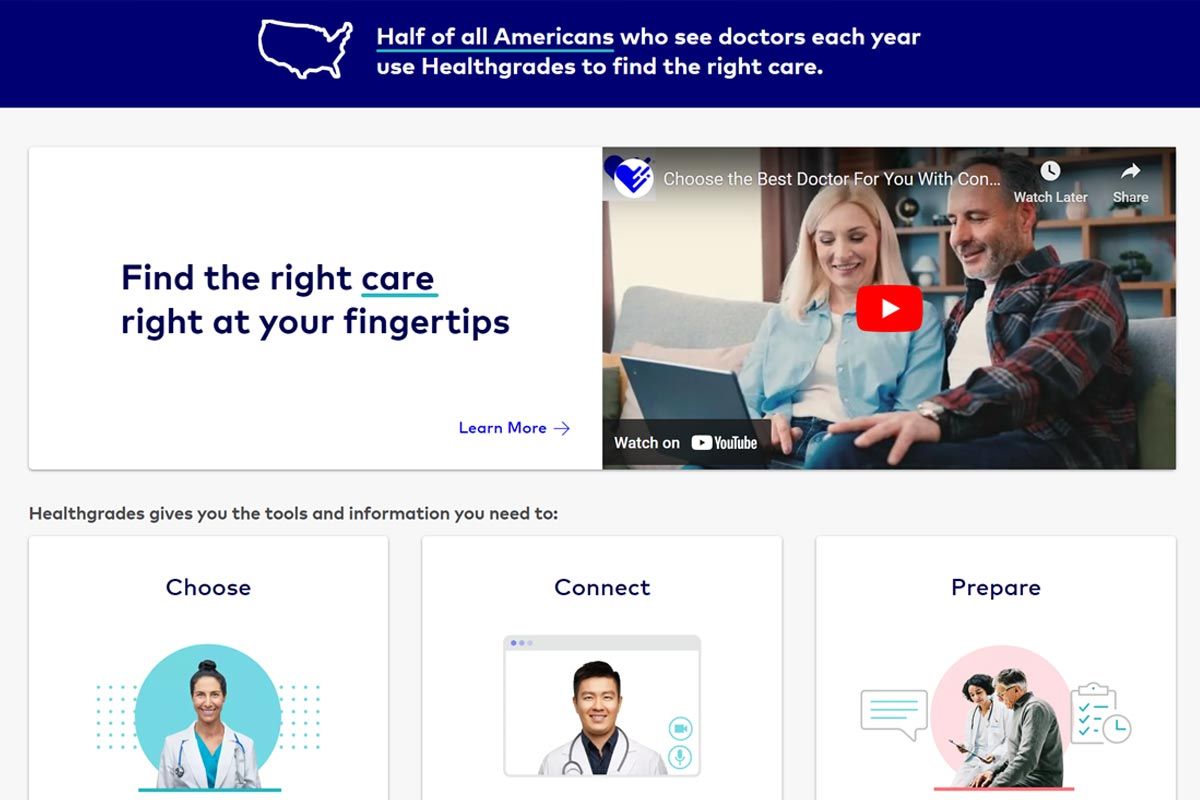
Online reputation management for doctors: top tools and strategies (2023)
Discover the tools and tactics for doctors to take back control and manage their online reputation
Table of Contents
Today more than ever, maintaining a positive online reputation has become essential for doctors and physicians. With patients increasingly turning to online review sites for information and reviews, your online presence can influence their perception of your professionalism and expertise. In this article, we will explore the importance of online reputation for doctors and provide strategies to help you improve and manage your professional image effectively.
Understanding the Importance of Online Reputation for Doctors
Your online reputation plays a significant role in shaping patients' perception of your practice and can directly impact your success as a doctor. With the abundance of information available on the internet, patients often turn to online reviews and ratings to gather insights and make informed decisions about their healthcare providers.
When it comes to healthcare, trust and credibility are paramount. Patients want to feel confident in their choice of doctor, knowing that they will receive the best possible care. This is where online reputation management comes into play. It goes beyond merely building a positive image; it also contributes to patient trust and satisfaction.
The Role of Online Reputation in Healthcare
A strong online reputation establishes your credibility and reliability, demonstrating to potential patients that you are dedicated to providing quality care. It shows that you have a track record of positive patient experiences and that you prioritize patient satisfaction.
Furthermore, a positive online reputation can help you stand out from your competitors. In today's digital age, patients have numerous options when it comes to choosing a healthcare provider. By having a strong online presence and reputation, you increase your chances of attracting new patients and retaining existing ones.

How Patients Use Online Information in Choosing Doctors
Studies have shown that patients rely heavily on online information when choosing a doctor. They search for reviews and ratings, examine your website, and review your social media presence before making an appointment. This is because patients want to gather as much information as possible to ensure they are making the right decision for their healthcare needs.
Online reviews and ratings provide patients with valuable insights into the quality of care you provide. Positive reviews can instill confidence in potential patients, assuring them that they will receive excellent treatment. On the other hand, negative reviews can raise concerns and deter patients from choosing your practice.
It is crucial, therefore, to proactively manage your online reputation. This involves monitoring and responding to patient reviews, addressing any concerns or issues promptly. By actively engaging with patients online, you can demonstrate your commitment to their satisfaction and show that you value their feedback.
In addition to reviews, patients also examine your website and social media presence. A well-designed and informative website can provide patients with a glimpse into your practice, showcasing your expertise and the services you offer. Similarly, an active and engaging social media presence can help build a sense of community and trust among your patients.
In conclusion, understanding the importance of online reputation for doctors is crucial today. Your online reputation not only shapes patients' perception of your practice but also plays a significant role in attracting and retaining patients. By proactively managing your online presence, engaging with patients, and providing quality care, you can establish a strong online reputation that sets you apart from your competitors.
Key Elements of Online Reputation for Doctors
Building a robust online reputation involves multiple elements that contribute to your overall professional image. Here are some essential components:
Online Reviews and Ratings
Online reviews and ratings are one of the most influential factors in patients' decision-making process. Encourage your satisfied patients to leave positive reviews on popular review platforms, such as your Google Business Profile, Healthgrades, or RateMDs. Regularly monitor and respond to these reviews to show your commitment to patient satisfaction.
Tip: you can monitor all these review sites via Cloutly.

Positive online reviews not only help potential patients gain trust in your practice but also improve your search engine rankings. When patients search for doctors in your area, having a high number of positive reviews can significantly increase your visibility and attract more patients to your practice.
Furthermore, responding to negative reviews in a professional and empathetic manner demonstrates your dedication to addressing patient concerns. By addressing these issues publicly, you show potential patients that you are committed to providing high-quality care and resolving any issues that may arise.
Social Media Presence
Establishing a strong social media presence can help you connect with patients and showcase your expertise. Share valuable healthcare information, engage with your audience, and address any concerns or questions promptly. By actively participating in social media conversations, you can build credibility and establish yourself as a trusted healthcare professional.
Social media platforms, such as Facebook, Twitter, and Instagram, provide an opportunity to share educational content, health tips, and updates about your practice. By consistently posting relevant and informative content, you can position yourself as a thought leader in your field. This not only helps attract potential patients but also fosters patient loyalty and engagement.
Additionally, social media allows for direct communication with patients, creating a more personalized and interactive experience. Responding to patient inquiries and comments in a timely manner shows that you value their input and are committed to providing exceptional care.
Professional Website
A well-designed and informative website is a vital asset for doctors. Create a professional website that highlights your qualifications, services, and patient testimonials. Consider starting a blog to share educational articles, relevant news, and updates. This positions you as an authority in your field and helps attract potential patients.
Your website should have a user-friendly interface, making it easy for patients to navigate and find the information they need. Include a comprehensive list of the services you offer, along with detailed descriptions, to help patients understand how you can meet their healthcare needs.
Remember to update your website regularly with fresh content to keep patients engaged and informed. This demonstrates your commitment to staying current with medical advancements and ensures that your website remains a valuable resource for patients seeking reliable healthcare information.
Strategies for Building a Positive Online Reputation
Now that we understand the key elements of online reputation, let's explore effective strategies for building and maintaining a positive online presence:
Building a positive online reputation is crucial in today's digital age. With the increasing reliance on online platforms for information and decision-making, it is essential for professionals to establish a strong and positive presence. Here are some strategies that can help you achieve that:
Encouraging Patient Reviews
One of the most powerful ways to build a positive online reputation is by encouraging your patients to leave reviews and ratings. After providing excellent care, take the initiative to ask your patients for feedback. You can do this by sending a follow-up email with links to review platforms or by providing handouts requesting feedback at the end of each appointment.
Positive reviews not only enhance your reputation but also boost your visibility online. When potential patients search for your name or practice, seeing a multitude of positive reviews can instill trust and confidence in your services.
Managing Negative Feedback
While positive reviews are essential, negative feedback is inevitable. It is crucial to handle negative reviews and feedback gracefully. When encountering negative feedback, it is important not to ignore or dismiss it. Instead, respond promptly and professionally.
Acknowledge the concerns raised by the patient and offer solutions or further assistance privately. By demonstrating empathy and a willingness to address issues, you can mitigate the impact of negative feedback. Potential patients will appreciate seeing that you take their concerns seriously and are committed to resolving any issues that may arise.
Establishing a Strong Social Media Presence
Having a strong social media presence is essential for building a positive online reputation, and engaging with patients on social media platforms can significantly strengthen your professional image.
Regularly post informative content that is relevant to your field of expertise. This can include articles, tips, and updates on the latest advancements in your industry. By sharing valuable information, you position yourself as a knowledgeable and reliable source of information.
In addition to posting content, it is important to engage in conversations with your followers. Respond to comments and messages promptly, and address any questions or concerns that patients may have. This interactive approach showcases your expertise and fosters a sense of trust and connection with your audience.
Building a positive online reputation requires time and effort, but the benefits are well worth it. By implementing these strategies, you can establish yourself as a trusted professional in your field and attract more patients to your practice.
Maintaining Your Online Reputation
Developing a positive online reputation requires ongoing effort and continuous monitoring. Make sure to maintain your online presence with these strategies:
Regular Monitoring and Updates
Consistently monitor your online presence and promptly respond to any new reviews or comments. Regularly update your website and social media profiles to reflect your current practice information, services, and achievements. Staying active and engaged demonstrates that you are committed to providing the best patient experience.
When it comes to monitoring your online presence, it's important to use tools that can help you keep track of what people are saying about you. Set up Google Alerts for your name and practice so that you receive notifications whenever your name is mentioned online. This way, you can stay on top of any new reviews or comments that may come up.
In addition to monitoring, it's crucial to regularly update your website and social media profiles. This includes updating your contact information, adding new services or treatments you offer, and showcasing any recent achievements or awards. By keeping your online presence up to date, you show potential patients that you are actively involved in your practice and dedicated to providing the best care.
Responding to Online Reviews
Whether positive or negative, responding to online reviews is crucial. Express gratitude for positive feedback, highlighting your commitment to patient care. When addressing negative reviews, respond empathetically, offering solutions to resolve any concerns. Show prospective patients that you are attentive to feedback and dedicated to providing excellent care.
Responding to online reviews is not only important for the person who left the review, but it also shows potential patients that you value their opinions and are willing to address any issues that may arise. When responding to positive reviews, take the time to thank the patient for their kind words and let them know how much you appreciate their feedback. This not only shows gratitude but also encourages other patients to leave positive reviews as well.
When it comes to negative reviews, it's important to respond in a professional and empathetic manner. Acknowledge the patient's concerns and offer a solution to resolve the issue. This shows that you take their feedback seriously and are committed to improving the patient experience. Remember, potential patients will be reading these reviews, so it's important to handle negative feedback with care and professionalism.
Staying Active on Social Media
Consistency is key when it comes to social media. Regularly post valuable content related to healthcare, educate your audience, and engage in discussions. Respond to comments and messages promptly to connect with patients and build lasting relationships.
Social media is a powerful tool for building your online reputation. By consistently posting valuable content, you position yourself as an expert in your field and provide helpful information to your audience. This can include sharing articles or blog posts related to healthcare, providing tips for maintaining a healthy lifestyle, or showcasing success stories from your practice.
In addition to posting content, it's important to engage with your audience. Respond to comments and messages in a timely manner, showing that you are accessible and interested in what they have to say. This can help build trust and loyalty among your patients, as they feel heard and valued.
Furthermore, social media provides an opportunity to showcase your personality and the unique aspects of your practice. Share behind-the-scenes photos or videos, introduce your staff, or highlight any community involvement or charitable work you are involved in. This humanizes your practice and helps potential patients connect with you on a more personal level.
In conclusion, online reputation management for doctors is vital in today's digital landscape. By understanding the importance of your online presence, focusing on key elements such as online reviews, social media, and a professional website, you can build a positive professional image. Implementing strategies like encouraging patient reviews, managing negative feedback, and maintaining an active online presence will help you improve your online reputation and attract more patients while establishing yourself as a trustworthy healthcare provider.



